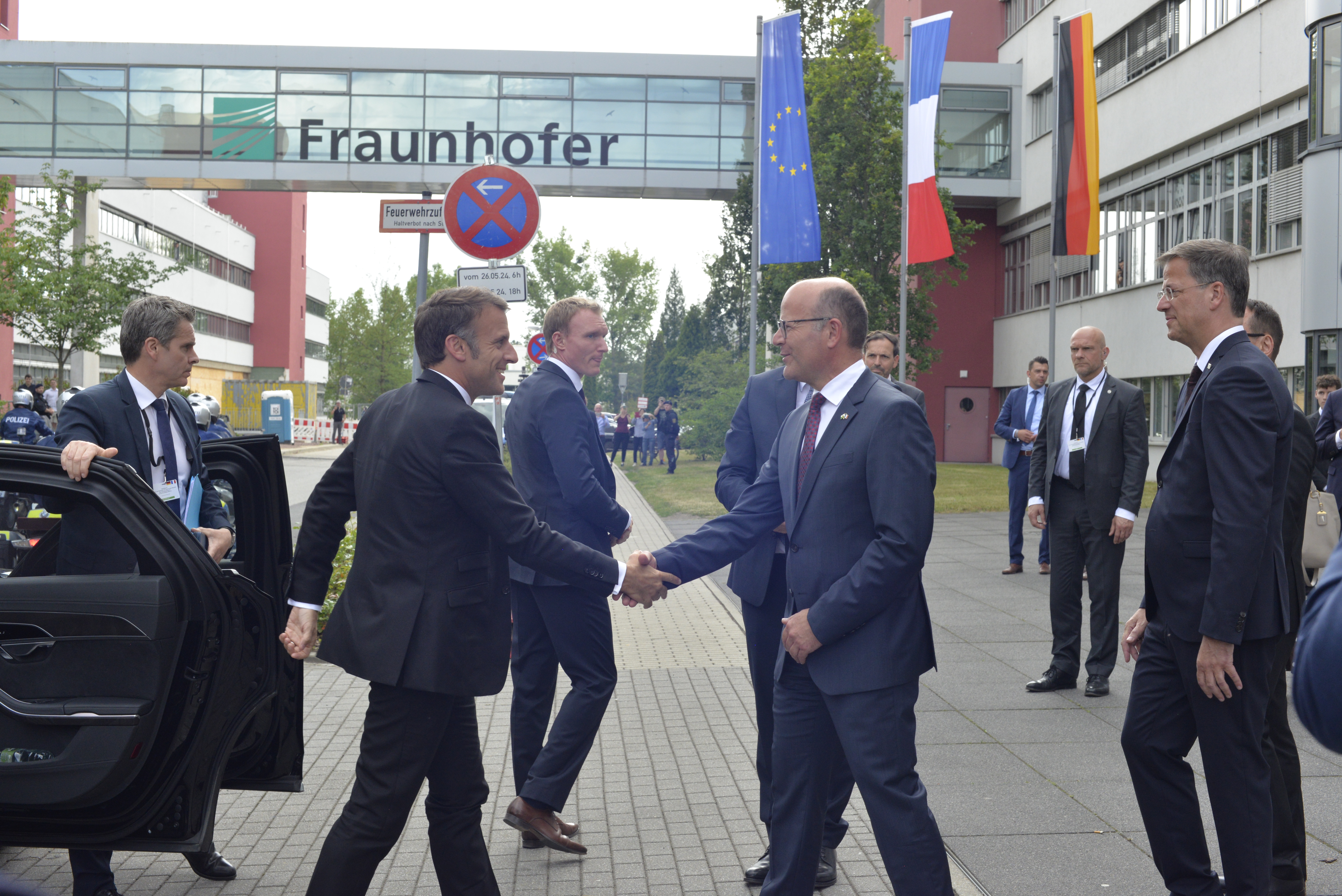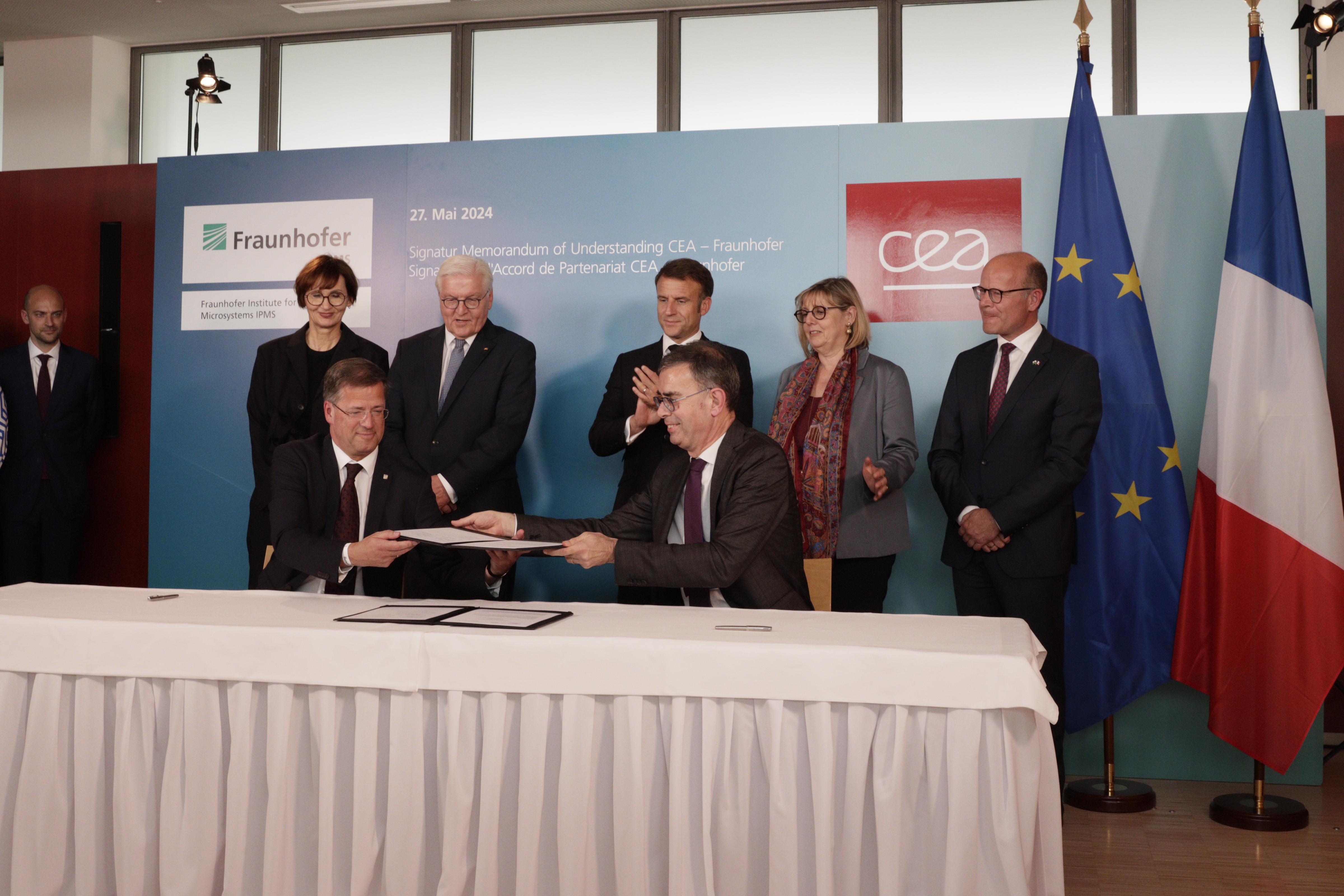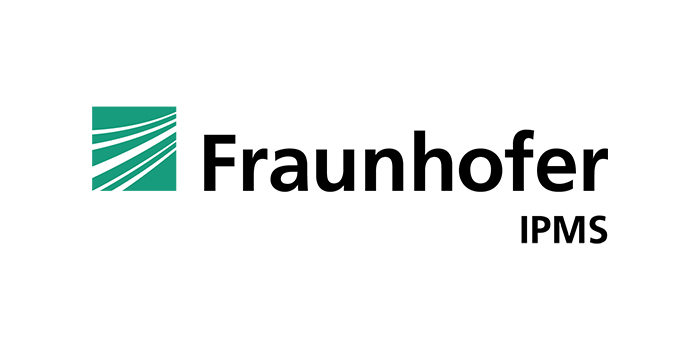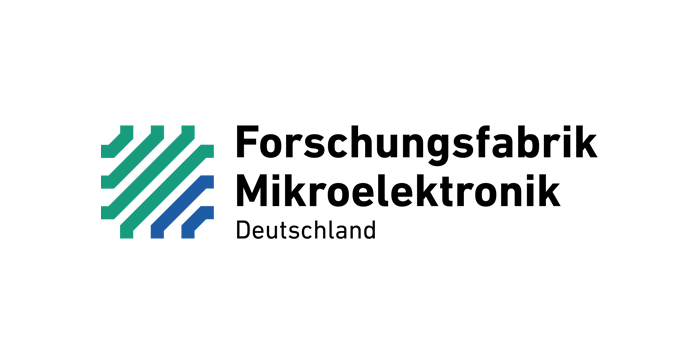French state visit to Fraunhofer highlights the importance of microelectronics
Macron and Steinmeier visit Fraunhofer in Dresden
Following an invitation from German President Frank-Walter Steinmeier, French President Emmanuel Macron made the first official French state visit to Germany in 24 years. During their three-day schedule, both presidents also visited the Fraunhofer Institute for Photonic Microsystems IPMS in Dresden to highlight the importance of collaboration between France and Germany in ensuring Europe's technological sovereignty, particularly in the field of microelectronics.



Dresden is one of Europe's most important locations for the semiconductor industry and thus key to strengthening Europe’s technological independence. One of Emmanuel Macron's priorities as president is Europe's sovereignty in technological development. During his visit, he stressed the importance of Franco-German collaboration in achieving this. So it is no coincidence that the only item on the agenda of the state visit relating to technology and science took place in Dresden.
At Fraunhofer IPMS, the two presidents, together with high-ranking representatives from government, science and industry, were given demonstrations of high-tech research in the fields of microelectronics, medical engineering and quantum technologies. Among the eminent guests were Sylvie Retailleau, the French Minister for Higher Education and Research, Bettina Stark-Watzinger, German Federal Minister of Education and Research, Jean-Noël Barrot, French Minister Delegate for Europe, Anna Lührmann, Minister of State for Europe and Climate at the German Federal Foreign Office, and Oliver Schenk, Minister of State for Federal Affairs and Media and Chief of the State Chancellery of Saxony.
Researchers presented the latest semiconductor components manufactured on wafers, sensor rings for condition monitoring in mechanical engineering, and a laser scanner microscope for real-time detection of cancer cells in the operating room. The Fraunhofer institute has a long-standing collaboration with the leading French research institute CEA-Leti (Commissariat à l'énergie atomique et aux énergies alternatives CEA) — for example, with microelectronics on 300 mm wafers. The joint projects also have great European relevance within the framework of the EU Chips Act. The initiative aims to strengthen Europe's competitiveness in semiconductor applications and prevent bottlenecks in this field. As a contribution to the EU Chips Act, a European consortium under the leadership of the Research Fab Microelectronics Germany (FMD) plans to establish the most comprehensive and advanced pilot line for advanced heterogeneous system integration and advanced packaging over the coming years. CEA-Leti is an important partner in this project.
To further promote and enhance collaboration between the Fraunhofer and CEA institutes, François Jacq, President of the CEA, and Prof. Axel Müller-Groeling, Executive Vice President for Research Infrastructures and Digital Transformation at Fraunhofer, signed a memorandum of understanding (MoU) during the visit. The aim is to initiate closer collaboration and joint initiatives in the strategic areas of microelectronics, quantum technologies, solar and hydrogen technologies, the circular economy of CO2 and critical raw materials as well as state-of-the-art battery technology.
Prof. Müller-Groeling explained: “Collaboration across national borders helps to shape our future. Our close links with partners, such as the CEA on the one hand and industry on the other, enable us to work together to translate key technologies into practical applications and strengthen our position as a driver of innovation in European industry. Our applied research in particular is making a significant contribution to the technological sovereignty and competitiveness of Europe as a hub of industrial activity.”
François Jacq emphasized: “I am delighted that this agreement has been signed between the CEA and Fraunhofer, two leading research partners in Europe, at a time when it is necessary to join forces to address the challenges of a more sovereign, greener and more inclusive Europe. This agreement will allow us to develop and enhance collaboration in the strategic areas of microelectronics, quantum technologies, solar technology, hydrogen, circular economy, and critical raw materials.”
The signing of the MoU was followed by a panel discussion with both presidents and invited guests on the topic of artificial intelligence, in which Prof. Katharina Hölzle, Director of the Fraunhofer Institute for Industrial Engineering IAO, took part on behalf of the Fraunhofer-Gesellschaft.
 Fraunhofer Institute for Photonic Microsystems
Fraunhofer Institute for Photonic Microsystems

